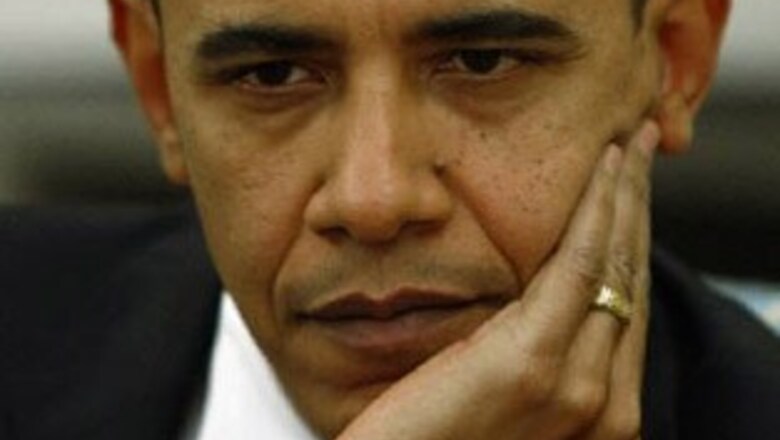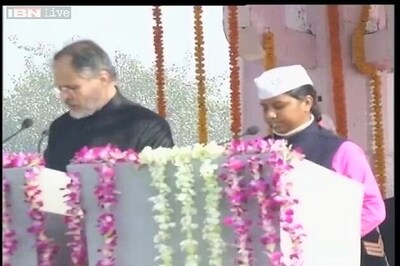
views
Reuters: US President Barack Obama accepts the Nobel Peace Prize on Thursday for his "extraordinary efforts to strengthen international diplomacy," despite making little headway in the world's trouble spots.
In his nearly 11 months in office, Obama has made a sharp break from his predecessor George W. Bush's mostly unilateral approach to diplomacy to try to fix the United States' tarnished image and deal with a formidable set of foreign policy challenges.
He has reached out to the Muslim world, started mending fences with the Europeans and sought to repair strained relations with Russia. But in Afghanistan, the Middle East, Iran and North Korea, his fledgling administration has found it tough going.
Afghanistan
Obama inherited the eight-year-old war from Bush and wasted no time in ordering an initial review in March and deploying 21,000 more troops to fight a resurgent Taliban. In the months that followed, the U.S. death toll and insurgent violence reached record levels. Obama's top general in Afghanistan, Stanley McChrystal, warned during the summer the situation was swiftly deteriorating and that he needed more troops to reverse the Taliban's momentum.
Obama last week ordered 30,000 additional troops to the war zone, narrowed the goals of the mission to defeating al Qaeda and accelerating training of Afghan security forces, and gave McChrystal a tight timetable to show results.
Middle East peace
Obama raised expectations of a possible breakthrough in stalled Israeli-Palestinian peace talks after putting it at the top of a packed foreign policy agenda on his first full day in office. At first, he took a tough approach with Israel, demanding an end to the construction of settlements in occupied territory. But in the face of repeated rebuffs from Israeli Prime Minister Benjamin Netanyahu, Obama has softened his stance on the settlement issue and says such a freeze should not be a precondition to restarting peace talks.
Palestinian President Mahmoud Abbas, disillusioned by what he sees as Obama's about-face, has said he will not run for re-election next year. Arab states have ignored Obama's call for confidence-building measures toward Israel. His only achievement to date was arranging an awkward handshake between Netanyahu and Abbas in New York on the sidelines of a U.N. General Assembly session.
Iran
Iran's leaders have proved stubbornly resistant to Obama's overtures. He has pursued a policy of engagement to end Iran's stand-off with Western powers over its nuclear program, eschewing Bush's approach of isolating Iran and imposing tougher sanctions. But with a year-end deadline fast approaching for Iran to accept a UN-brokered deal, sanctions look more likely.
Obama has proven more successful than Bush in persuading fellow members of the U.N. Security Council, notably Russia and China, to accept in principle that more sanctions may be necessary, but it remains unclear whether any new package would win approval.
Iraq
Obama has committed U.S. forces to withdrawing from Iraq by the end of 2011, but their combat mission will end sooner, by August 2010. Iraq is not high on the president's list of priorities and aides have made clear the withdrawal timetable is virtually unshakable, despite continued violence like Tuesday's coordinated bomb attacks in Baghdad that killed more than 100 people and wounded scores. Overall violence is sharply down, however, and after months of bickering, political parties have agreed to hold elections next March.
North Korea
Like Iran, North Korea has frustrated Obama's attempts to engage with the reclusive state, although there have been tentative signs his policy could yield some progress. Obama's first envoy to North Korea was in Pyongyang this week to try to coax the country back to nuclear talks it quit a year ago. North Korean leader Kim Jong-il signaled in October he was willing to return to six-way talks on its nuclear program if the United States dispatched an envoy to the country.
Nuclear non-proliferation
Obama laid out his vision for a world free of nuclear weapons earlier this year as Russia and the United States began talks on a new agreement to replace the 1991 Strategic Arms Reduction Treaty, which formally expired last week. The two sides have so far failed to reach an agreement but Russian officials say they expect to have a deal by the end of the year. Agreement on a successor to START would allow Obama to point to a significant foreign policy achievement.
While widely praised, including by the Nobel Committee, for his lofty goal of eventual nuclear disarmament, Obama has yet to articulate in any significant detail how major atomic powers might be coaxed into abandoning their arsenals.




















Comments
0 comment